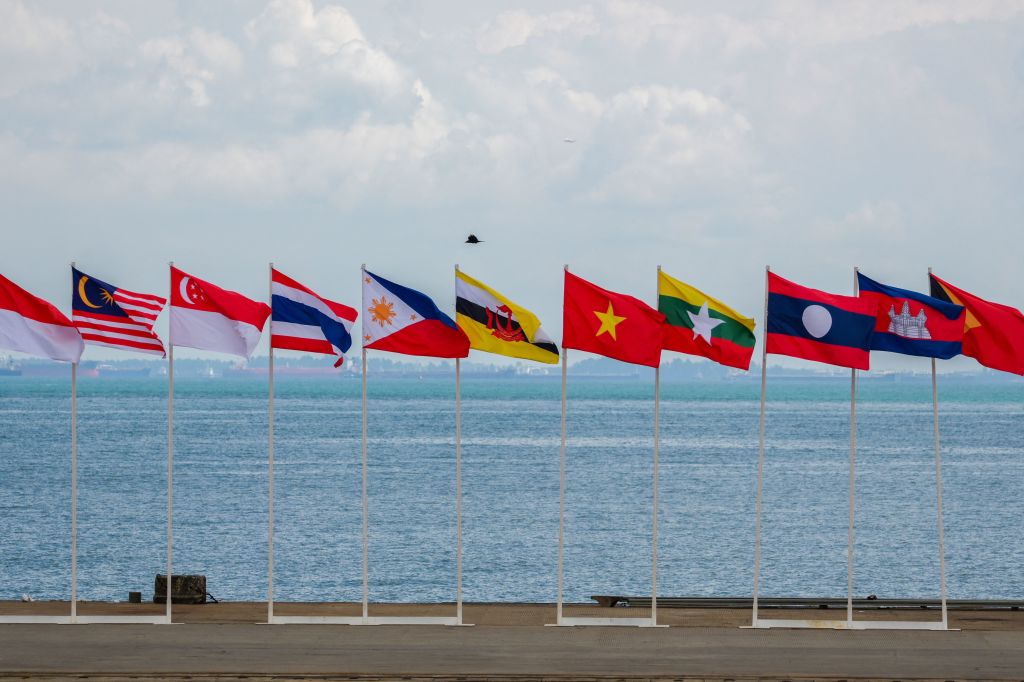
For the first time in the five years that Southeast Asians have been annually surveyed on who their preferred partner would be if they had to align with China or the United States, China has overtaken the U.S. as the preferred choice of the Association of Southeast Asian Nations (ASEAN), according to the latest report by Singapore-based think tank ISEAS-Yusof Ishak Institute. But, experts warn, the findings display far from a unanimous tilt towards China amid the great-power rivalry vexing the region.
[time-brightcove not-tgx=”true”]Almost 2,000 respondents across the 10 member states of the geopolitical union were asked the question: “If ASEAN were forced to align itself with one of the strategic rivals, which should it choose?”
This year, seven out of the 10 countries—Brunei, Cambodia, Indonesia, Laos, Malaysia, Myanmar, and Thailand—polled higher in favor of China compared to last year, with the biggest changes seen in Laos and Malaysia, which jumped by 29.5% and 20.3%, respectively. At the same time, preference for China fell in the Philippines, Singapore, and Vietnam.
To calculate an overall ASEAN score, results from each of the 10 member states were given a 10% weighting regardless of their population differences—Brunei, the smallest ASEAN state, has a population of less than half a million, while Indonesia, the region’s largest, has around 280 million people. ISEAS chose this approach “because the consensus-making decision process in ASEAN is based on equal say,” Sharon Seah, a senior fellow at the institute’s ASEAN Studies Centre and a lead author of the annual report, tells TIME. (Survey respondents included people from five categories: academia and think tanks; private sector; civil society, non-governmental organizations, or media; government officials; and regional or international organizations.)
Despite the headline-grabbing takeaway that ASEAN seems to be gravitating toward China, experts—including Seah—say the report actually demonstrates the difficulty of attributing a unified attitude toward the U.S.-China rivalry to the notoriously divided bloc.
“Each country maintains its own agency and views on the U.S.-China binary question. Hence we cannot assume that the region has a united view about China or the U.S.,” says Seah. “Countries apply different calculus to their bilateral relations with each superpower.”
Mark S. Cogan, associate professor of peace and conflict studies at Japan’s Kansai Gaidai University, tells TIME that the recent survey results are hardly surprising, since “ASEAN as an institution is divided and has so many different displays of behavior when it comes to U.S.-China relations.” Many ASEAN states have generally maintained close economic ties with China—through trade and investments in development—while simultaneously hedging against its aspirations for influence and territorial expansion through defense partnerships with the U.S.
Exemplifying this strategy, Indonesia’s President-elect Prabowo Subianto met Chinese leader Xi Jinping in Beijing on Monday, with both sides vowing to boost strategic cooperation in a show of warm bilateral ties, shortly before Prabowo departed for Japan, a prominent U.S. ally, to meet with Japanese Prime Minister Fumio Kishida and Defense Minister Minoru Kihara.
And as China amps up its aggressiveness in the South China Sea, where it maintains territorial disputes with the Philippines, Vietnam, Malaysia, Brunei, and Indonesia, Southeast Asian states have looked to the U.S. for defense support. Notably, however, China has for years also been the Philippines’ top trading partner.
Meanwhile, Thailand’s Prime Minister Srettha Thavisin has fervently courted both China and the U.S. for investments in Thailand, particularly a billion dollar infrastructural project to build a land bridge across the country as an alternative to shipments through the busy Malacca Strait.
“The key takeaway,” says Seah, “is that as the geopolitical environment becomes more volatile, the region is looking to enhance its internal resilience.”
Consistent with previous years, ISEAS’ 2024 report found that about half of respondents, when asked how ASEAN should respond to the U.S.-China rivalry, said it should “enhance its resilience and unity to fend off pressure from the two major powers.”
ISEAS’ annual report, published since 2019, includes survey results about the most pressing political issues in the region—ranging from how ASEAN should deal with Myanmar’s junta to how it should act if conflict erupts in the Taiwan Strait.
“It’s very difficult to say there’s just one ASEAN—at the institutional level—response to [the] U.S.-China rivalry, because it’s so intricately detailed and complex,” says Cogan. “It depends on the country, [and it] depends on the segment—whether it’s counterterrorism, diplomacy, security, or Myanmar. The variety of responses from state to state, within the institution, can be limitless.”
from TIME https://ift.tt/ZM6bp4X
via IFTTT
No comments:
Post a Comment